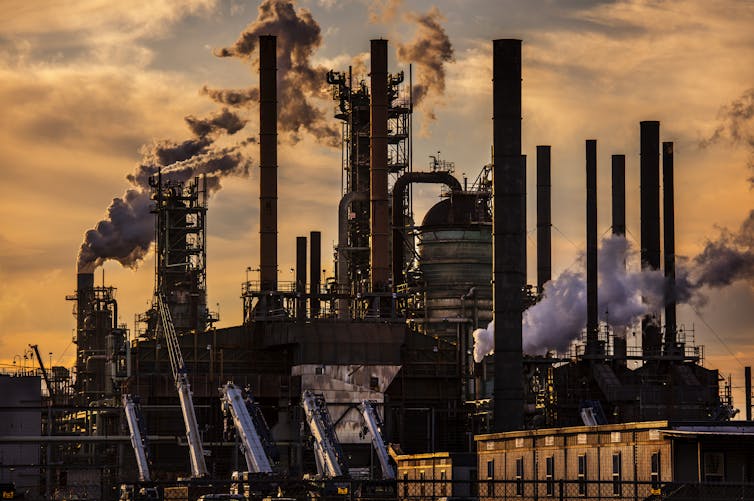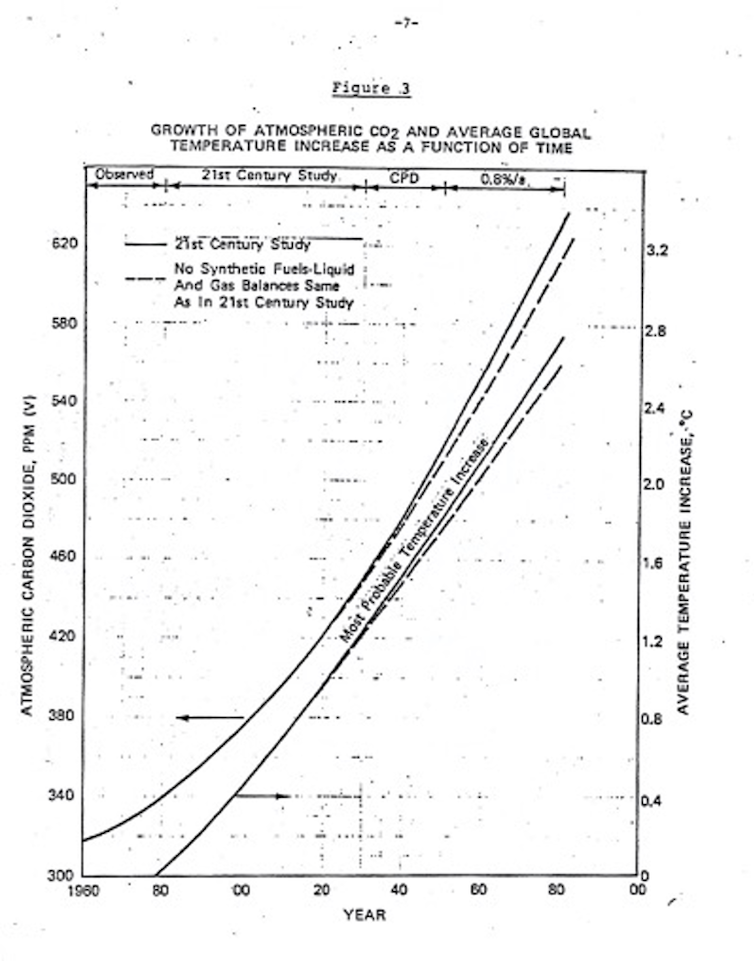At an old gunpowder factory in Delaware — now a museum and archive — Benjamin Franta found a transcript of a petroleum conference from 1959 that included a speech by Edward Teller.

The oil industry was aware of the risks of climate change decades ago. (Barry Lewis/InPictures via Getty Images)
By Benjamin Franta
Stanford University
 Four years ago, I traveled around America, visiting historical archives. I was looking for documents that might reveal the hidden history of climate change – and in particular, when the major coal, oil and gas companies became aware of the problem, and what they knew about it.
Four years ago, I traveled around America, visiting historical archives. I was looking for documents that might reveal the hidden history of climate change – and in particular, when the major coal, oil and gas companies became aware of the problem, and what they knew about it.
I pored over boxes of papers, thousands of pages. I began to recognize typewriter fonts from the 1960s and ‘70s and marveled at the legibility of past penmanship, and got used to squinting when it wasn’t so clear.
What those papers revealed is now changing our understanding of how climate change became a crisis. The industry’s own words, as my research found, show companies knew about the risk long before most of the rest of the world. [That energy companies suppressed their knowledge, from at least 1981, of the impact of burning fossil fuels first became known in 2015.]
On Oct. 28, a congressional subcommittee questioned executives from Exxon, BP, Chevron, Shell and the American Petroleum Institute about industry efforts to downplay the role of fossil fuels in climate change. Exxon CEO Darren Woods told lawmakers that his company’s public statements “are and have always been truthful” and that the company “does not spread disinformation regarding climate change.”
Here’s what corporate documents from the past six decades show.
Surprising Discoveries
At an old gunpowder factory in Delaware — now a museum and archive — I found a transcript of a petroleum conference from 1959 called the “Energy and Man” symposium, held at Columbia University in New York. As I flipped through, I saw a speech from a famous scientist, Edward Teller (who helped invent the hydrogen bomb), warning the industry executives and others assembled of global warming.
“Whenever you burn conventional fuel,” Teller explained, “you create carbon dioxide. … Its presence in the atmosphere causes a greenhouse effect.” If the world kept using fossil fuels, the ice caps would begin to melt, raising sea levels. Eventually, “all the coastal cities would be covered,” he warned.
1959 was before the moon landing, before the Beatles’ first single, before Martin Luther King’s “I Have a Dream” speech, before the first modern aluminum can was ever made. It was decades before I was born. What else was out there?
In Wyoming, I found another speech at the university archives in Laramie — this one from 1965, and from an oil executive himself. That year, at the annual meeting of the American Petroleum Institute, the main organization for the U.S. oil industry, the group’s president, Frank Ikard, mentioned a report called “Restoring the Quality of Our Environment” that had been published just a few days before by President Lyndon Johnson’s team of scientific advisers.
“The substance of the report,” Ikard told the industry audience, “is that there is still time to save the world’s peoples from the catastrophic consequences of pollution, but time is running out.” He continued that, “One of the most important predictions of the report is that carbon dioxide is being added to the earth’s atmosphere by the burning of coal, oil, and natural gas at such a rate that by the year 2000 the heat balance will be so modified as possibly to cause marked changes in climate.”
Ikard noted the report had found that a “nonpolluting means of powering automobiles, buses, and trucks is likely to become a national necessity.”

Transportation is now the leading source of carbon dioxide emissions in the U.S., followed by electricity. (David L. Ryan/The Boston Globe via Getty Images)
As I reviewed my findings back in California, I realized that before San Francisco’s Summer of Love, before Woodstock and the peak of the ’60s counterculture, the heads of the oil industry had been privately informed by their own leaders that their products would eventually alter the climate of the entire planet, with dangerous consequences.
Secret Research Revealed Risks Ahead
While I traveled the country, other researchers were hard at work too. And the documents they found were in some ways even more shocking.
By the late 1970s, the American Petroleum Institute had formed a secret committee called the “CO2 and Climate Task Force,” which included representatives of many of the major oil companies, to privately monitor and discuss the latest developments in climate science.
In 1980, the task force invited a scientist from Stanford University, John Laurmann, to brief them on the state of climate science. Today, we have a copy of Laurmann’s presentation, which warned that if fossil fuels continued to be used, global warming would be “barely noticeable” by 2005, but by the 2060s would have “globally catastrophic effects.”
That same year, the American Petroleum Institute called on governments to triple coal production worldwide, insisting there would be no negative consequences despite what it knew internally.

Exxon had a secretive research program too. In 1981, one of its managers, Roger Cohen, sent an internal memo observing that the company’s long-term business plans could “produce effects which will indeed be catastrophic (at least for a substantial fraction of the earth’s population).”
The next year, Exxon completed a comprehensive, 40-page internal report on climate change, which predicted almost exactly the amount of global warming we’ve seen, as well as sea level rise, drought and more. According to the front page of the report, it was “given wide circulation to Exxon management” but was “not to be distributed externally.”
And Exxon did keep it secret: We know of the report’s existence only because investigative journalists at Inside Climate News uncovered it in 2015.

Other oil companies knew the effects their products were having on the planet too. In 1986, the Dutch oil company Shell finished an internal report nearly 100 pages long, predicting that global warming from fossil fuels would cause changes that would be “the greatest in recorded history,” including “destructive floods,” abandonment of entire countries and even forced migration around the world. That report was stamped “CONFIDENTIAL” and only brought to light in 2018 by Jelmer Mommers, a Dutch journalist.
In October 2021, I and two French colleagues published another study showing through company documents and interviews how the Paris-based oil major Total was also aware of global warming’s catastrophic potential as early as the 1970s. Despite this awareness, we found that Total then worked with Exxon to spread doubt about climate change.
Big Oil’s PR Oivot
These companies had a choice.
Back in 1979, Exxon had privately studied options for avoiding global warming. It found that with immediate action, if the industry moved away from fossil fuels and instead focused on renewable energy, fossil fuel pollution could start to decline in the 1990s and a major climate crisis could be avoided.
But the industry didn’t pursue that path. Instead, colleagues and I recently found that in the late 1980s, Exxon and other oil companies coordinated a global effort to dispute climate science, block fossil fuel controls and keep their products flowing.
We know about it through internal documents and the words of industry insiders, who are now beginning to share what they saw with the public. We also know that in 1989, the fossil fuel industry created something called the Global Climate Coalition – but it wasn’t an environmental group like the name suggests; instead, it worked to sow doubt about climate change and lobbied lawmakers to block clean energy legislation and climate treaties throughout the 1990s.
For example, in 1997, the Global Climate Coalition’s chairman, William O’Keefe, who was also an executive vice president for the American Petroleum Institute, wrote in The Washington Post that, “Climate scientists don’t say that burning oil, gas and coal is steadily warming the earth,” contradicting what the industry had known for decades. The fossil fuel industry also funded think tanks and biased studies that helped slow progress to a crawl.
Today, most oil companies shy away from denying climate science outright, but they continue to fight fossil fuel controls and promote themselves as clean energy leaders even though they still put the vast majority of their investments into fossil fuels. As I write this, climate legislation is again being blocked in Congress by a lawmaker with close ties to the fossil fuel industry.
People around the world, meanwhile, are experiencing the effects of global warming: weird weather, shifting seasons, extreme heat waves and even wildfires like they’ve never seen before.
Will the world experience the global catastrophe that the oil companies predicted decades ago? That depends on what we do now, with our slice of history.
Benjamin Franta is a Ph.D. candidate in history at Stanford University.
This article is republished from The Conversation under a Creative Commons license. Read the original article.

But how does this fact help our species escape going EXTINCT?!!
Oil companies covered up their own early warnings of global warming because they were too hot, too big, and too complex to handle, as is evident now in Glasgow. Unfortunately, market share and stock price are more important than world survival — which is outside the rules of the game and adds nothing to the bottom line. I cringe at the horrors to come.
This is only half a story. All industry, like the military, do no raise/research/discuss an issue without also providing proposals for solutions.
Our esteemed doctoral candidate omitted that part.
But the answer is simple: electricity- from nuclear energy. We have long since solved the issue of smaller cleaner nuclear reactors.
Until we develop viable fusion reactors in the future, there is no other way to get away from fossil fuels.
We are an energy civilization, right now fossil fuels-based. Time to move on.
“Edward Teller (who helped invent the hydrogen bomb), warning the industry executives and others assembled of global warming.”
It is always interesting to find something that Edward Teller got right.
I greatly prefer the term ‘global warming’ to ‘climate change’. I think there has been some research that suggests that it is a much more effective term to use.
The Department of Defense uses 4,600,000,000 US gallons (1.7×1010 L) of fuel annually, an average of 12,600,000 US gallons (48,000,000 L) of fuel per day. A large Army division may use about 6,000 US gallons (23,000 L) per day.
This is just one more example of why we need to limit corporate profits and personal wealth. During the Eisenhower administration, the top tax rate was about 90%. During the 60s and early 70s, corporate regulations increased. All of the current problems stem from the fact that these trends were reversed by the Reagan administration, and then the reversal was continued under Clinton and all subsequent administrations. Now we have a situation where too much money and power are consolidated in a few hands, and there is no way to prevent that money from corrupting politics and the news media. Unless all that excess money is confiscated, it will continue to make a mockery of the notion that the US is a democracy. Currently, we are an oligarchy at best and perhaps even a plutocracy.
We published a White Paper at VCU in 1976 while I was still a student with the help of NOAA and several other universities around the land and drew the same conclusions as Ed Teller and those who came later and were told our research would be buried in a basement somewhere for obvious reasons. It’s not that you can’t fight city hall. It’s more that you can’t fight the billionaire class controlling city hall.
While I can accept that the billionaire class will likely ruin the planet for our children and beyond, I’ve never figured what they plan on doing once their greed kills them too. What? Do they really believe they are immune to the consequences of their greed? Good luck with that.
Burroughs gives the principle when he says “Hustlers of the world beware the one mark you cannot beat. The mark inside.”
They’re nuts. “Evil appears as good in the minds of those who the gods lead to destruction.” I think that’s from Antigone.